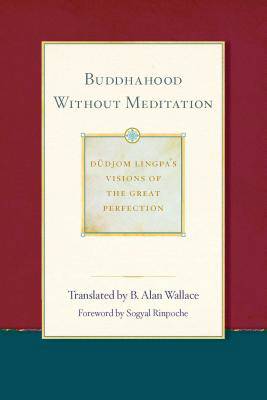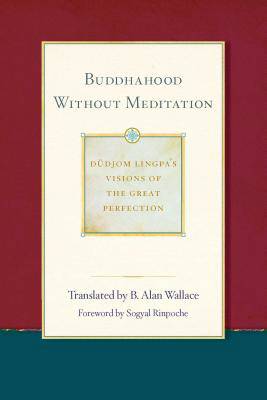
- Retrait gratuit dans votre magasin Club
- 7.000.000 titres dans notre catalogue
- Payer en toute sécurité
- Toujours un magasin près de chez vous
- Retrait gratuit dans votre magasin Club
- 7.000.0000 titres dans notre catalogue
- Payer en toute sécurité
- Toujours un magasin près de chez vous
Description
The revelations of Düdjom Lingpa, a highly influential mystic of 19th century Tibet, translated by B. Alan Wallace. The practice of Dzogchen, the Great Perfection, is the pinnacle of the nine vehicles of practice taught in the Nyingma school of Tibetan Buddhism. The highly influential mystic Düdjom Lingpa (1835-1904) and his disciple Sera Khandro (1892-1940), the most prolific female writer in Tibetan history, here illuminate the methods to discover our own primordial purity and abide in uncontrived awareness. Buddhahood Without Meditation: This is Düdjom Lingpa's most widely taught visionary text. In it wisdom beings and historical figures in the Great Perfection lineage emphasize the view of cutting through (trekchö) to the original purity of pristine awareness via the four special samayas, or pledges, of the Great Perfection: nonexistence, oneness, uniform pervasiveness, and spontaneous actualization. At each stage of his spiritual progress, Düdjom Lingpa's doubts are dispelled and his realizations enhanced by pithy advice. The Fine Path to Liberation: Sera Khandro establishes the necessary motivation and conduct for receiving teachings such as Buddhahood Without Meditation. This sublime Dharma is to be seen in the context of the five perfections of the sambhogakaya: the teacher, place, time, disciples, and Dharma are fully perfected and must not be reified as ordinary. Garland for the Delight of the Fortunate: Sera Khandro fills in the gaps of Buddhahood Without Meditation, explaining the metaphors, and spelling out the implications of the root text's highly condensed verses. This is an essential key for unlocking Düdjom Lingpa's profound wisdom.
Spécifications
Parties prenantes
- Auteur(s) :
- Editeur:
Contenu
- Nombre de pages :
- 344
- Langue:
- Anglais
- Collection :
- Tome:
- n° 2
Caractéristiques
- EAN:
- 9781614293460
- Date de parution :
- 17-01-17
- Format:
- Livre broché
- Format numérique:
- Trade paperback (VS)
- Dimensions :
- 152 mm x 229 mm
- Poids :
- 498 g

Les avis
Nous publions uniquement les avis qui respectent les conditions requises. Consultez nos conditions pour les avis.






